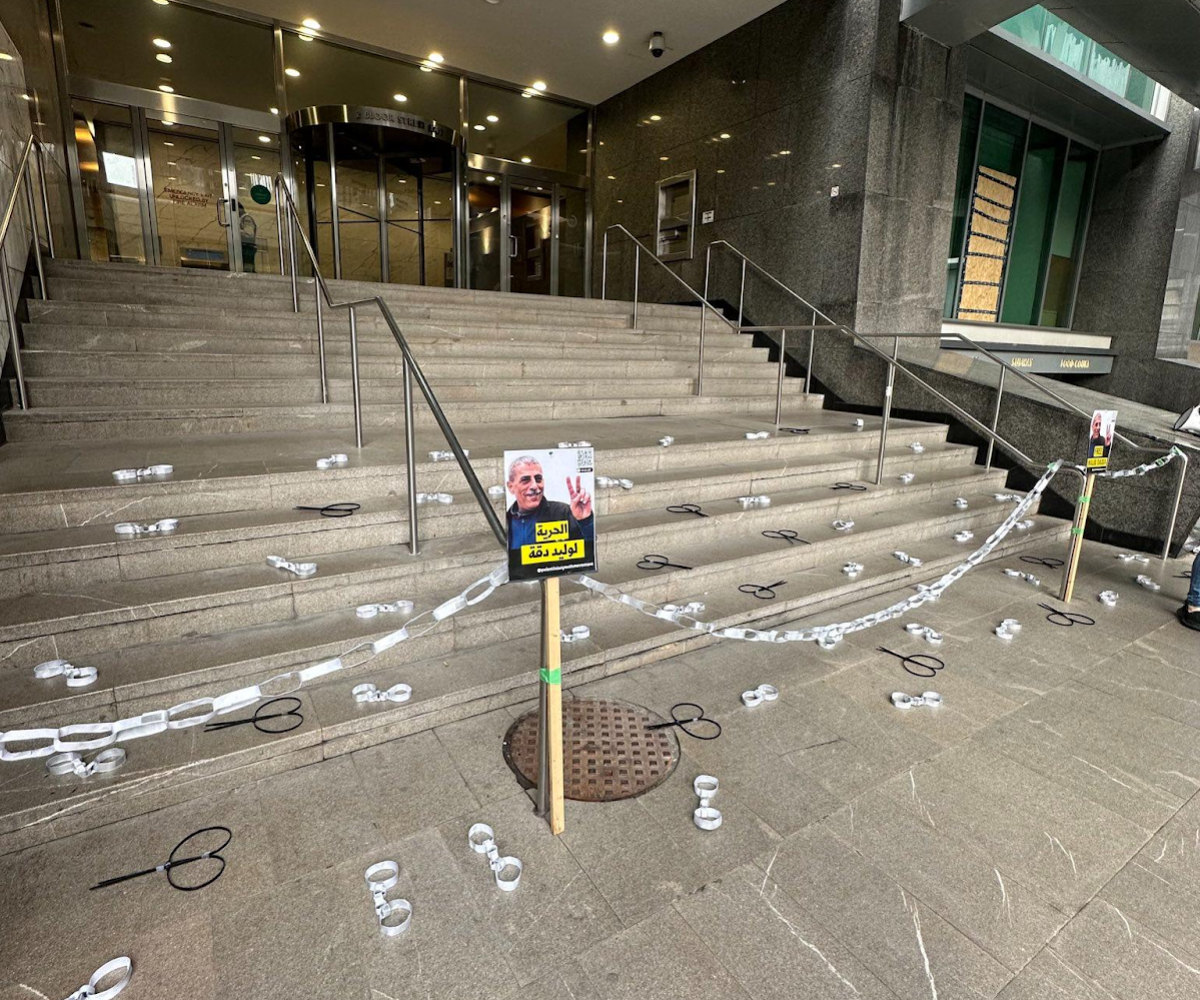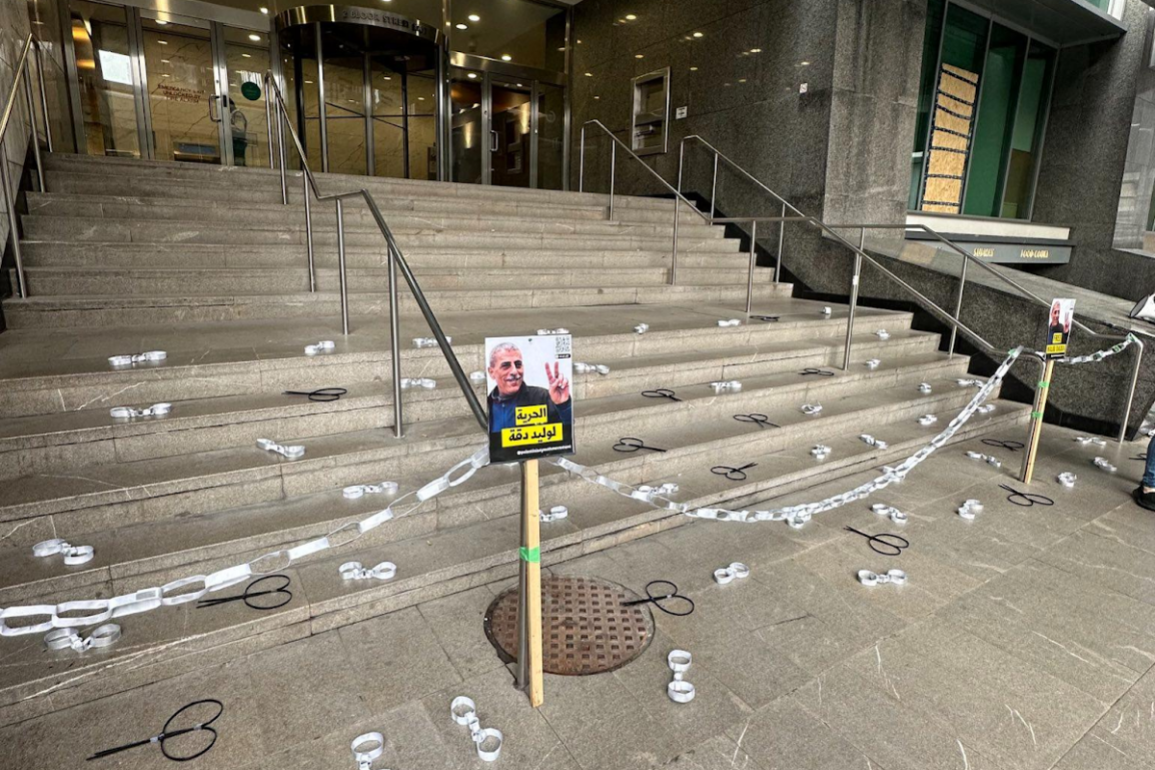
By Palestinian Youth Movement Toronto
Prisoners lie at the heart of the Palestinian struggle for national liberation. Palestinian prisoners are incarcerated by the Zionist entity for their refusal to capitulate to Zionist colonization, and their ongoing resistance in service for the liberation of the homeland.
Walid Daqqah, one of the longest held Palestinian prisoners, has been incarcerated in Zionist prison since 1986, following a resistance operation that he participated in, which resulted in the death of a Zionist Occupation soldier. While his sentence was supposed to end in March 2023, the Zionist state extended it for two years. Daqqah has been diagnosed with a rare form of bone marrow cancer, and the occupation refuses to release him or provide him with the medical care that he needs.
Colonial rules without lawful reason
This refusal represents a long-time colonial tactic of the Zionist entity: incarcerating Palestinian political leaders and subjecting them to torture and medical neglect, which at times has led to their martyrdom. The goal is to suppress resistance efforts by isolating freedom fighters from the rest of the population. Daqqah was a prominent resistance organizer, which is no doubt why he was targeted by the Zionist entity in the 1980s. His wife, Sanaa Salama, describes him as “a thinker, author, and one of the most important thinkers of the [Palestinian Prisoners] Movement and the Palestinian people in general.”
In Palestine, mass arrests have even been used as a form of collective punishment, and particularly have served to quell moments when resistance efforts are high. The Zionist entity can make these mass arrests because they hold many Palestinians under a policy of administrative detention. This is when someone is detained without having any charges laid against them or a trial because the state claims to have “secret information” related to their arrest that no one, not even the detainees’ lawyers, have access to. People can only be held under administrative detention for six months but it can be renewed indefinitely, with Palestinians having been held in administrative detention for as long as six years.
Daqqah, whose sentence was extended by two years in 2018, is just one prisoner who suffered from the occupation’s ability to impose colonial rules. Now, despite his cancer diagnosis, the Zionist entity is refusing to give him access to healthcare. Prisoners in Zionist jails are treated without dignity, forced to fight for everything from food to medical care.
Resistance in the face of Zionist incarceration
But political prisoners in Palestine – like those in liberation movements all over the world – are the backbone of the resistance. Daqqah, who has now spent 37 years in prison, finished a Master’s degree in political science while behind bars. He has written political theory papers and books, including one about life in prison and a children’s fiction book, which won the 2018 Etisalat Award for Arabic Children’s Literature in the young adult category.
His writing has often led to punishment in prison, such as solitary confinement and torture, as a way of trying to suppress his work. But Daqqah, like most political prisoners, has continued his revolutionary work despite the occupation’s best efforts. Daqqah represents the way in which Palestinian political prisoners have transformed the occupiers’ jails into sites of resistance, political struggle, and cultural production.
Daqqah’s resistance efforts and revolutionary thinking is exactly why he continues to be targeted by the Zionist occupation. His status is the reason “that Israeli authorities have made clear their intent to end his life in colonial prisons.” His life has already been stolen by Zionist prisons: he was married while imprisoned, had to have his sperm smuggled out to have a daughter in 2020 and still missed her birth. Now, the Zionist state has made it clear their intention to kill him slowly while incarcerated.
In an article he wrote as a foreword for Huey Newton’s Revolutionary Suicide, Ahmad Sa’adat, general secretary of the Popular Front for the Liberation of Palestine’s and political prisoner, talks about prisons as a colonial tool and the leadership and revolutionary model of political prisoners.
Sa’adat says, “Political prisoners are not simply individuals; they are leaders of struggle and organizing within prison walls that help to break down and dismantle the bars, walls, and chains that act to divide us from our peoples and communities in struggle. They face repeated isolation, solitary confinement, cruel tortures of the occupier and jailer that seek to break the will of the prisoner and their deep connection to their people.”
Justice for Daqqah, justice for all: take action now!
The Palestinian people refuse to allow for the prison to break our deep connection with our political prisoners, who we know are the compass of our struggle. It is precisely this refusal that has driven a global campaign for the release of Walid Daqqah.
Between July 7 and 15, the Palestinian Youth Movement (PYM) held a week of action for Walid, which was observed in over fourteen cities across North America and Britain.
In Toronto, PYM scattered the steps of the Zionist consulate with handcuffs and zip ties in order to bring attention to the Zionist state’s repression of our prisoners and call for Walid’s release. In NYC, a protest was organized outside the United Nations headquarters, calling on the international community to take action against the Zionist state’s continued imprisonment of Walid. In Houston, PYM held a letter-writing campaign to support the call to release Daqqah. Similar actions were held across major cities including London, Washington DC, Montreal, Dallas, Detroit, Ottawa, San Francisco, and Southern California.
Daqqah’s case is important for us to fight for. His life in prison is similar to so many other Palestinian prisoners who continue to be revolutionary thinkers behind bars, and we have to be ready to fight for them. To take action against his unjust imprisonment, send an email calling onto international officials to put pressure on the state of Israel for his immediate release.
Did you like this article? Help us produce more like it by donating $1, $2, or $5. Donate
This post was originally published on this site be sure to check out more of their content.







